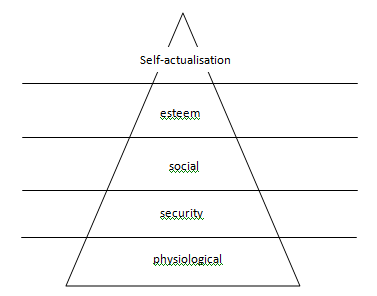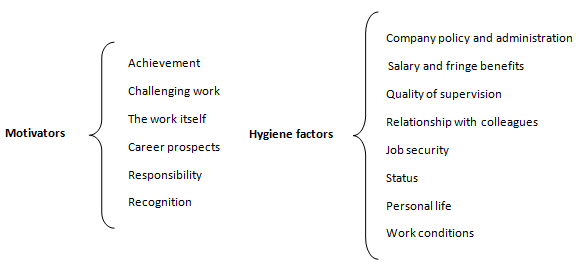

The works of managers is to ensure that staff works efficiently in an organisation. To achieve this, it is clear that managers must know what motivates people. By understanding the factors influencing motivation, they can create the conditions in which employees will perform to their maximum potential.
One of the best known theories of motivation was put forward by an American psychologist, Abraham Maslow, in a book entitled Motivation and personality (1954). In his theory, he presents a hierarchy of needs. He identified certain basic human needs and classified them in an ascending order of importance. Basic needs where at the bottom of the hierarchy, higher needs at the top. His classification is shown below:

Maslow said that people satisfied their needs in a systematic way. When a need had been met, it stopped being a motivating factor. For example, if a person was starving, he would not be too concerned about security and social needs. But once he had enough food, he would start thinking about those other needs.
Research into Maslow's theory has not been very conclusive. Studies have tended to show that needs vary greatly among individuals. At the higher levels in a company, self-actualisation needs may be very strong whereas at lower levels, social and security needs may be dominant.
Another theory of motivation, which has been very popular with managers, is Frederick Herzberg's "two-factor" theory. Hertzberg conducted a number or studies in the region of Pittsburg, USA, in the late 1950s. He concluded that at work there are certain factors which cause job satisfaction while others lead to dissatisfaction.
The group of factors bringing about satisfaction were called "motivators". They include things like a challenging job, responsibility, advancement, recognition etc. These factors give rise to positive satisfaction. Herzberg called the other group of factors "hygiene" or "maintenance" factors. These include company policy and administration, salary and fringe benefits, job security, status and personal life. These factors are considered to be only "dissatisfiers", not motivators. If they do not exist, they cause dissatisfaction. If they do exist in quality and quantity, they do not, however, give increased satisfaction.
Herzberg's two-factor theory is shown in the following diagram. It is worth noting that the hygiene factors refer to the context of the job - the conditions of work - while the motivators refer to job content.

Hygiene factors are essential if workers are to be motivated. As one writer has aptly put it, they deal with the question "Why work here?". The motivators deal with the question "Why work harder?".
If Herzberg's theory is true, it means that managers must pay great attention to job content. They must find ways of making jobs more challenging and interesting. As a result, managers in the USA and elsewhere have recently been showing interest in job enrichment programmes. The idea of such programmes is to make jobs more challenging and to give the worker a sense of achievement.
Sweden has been leading the way in this respect. At one car plant, for example, Volvo workers assemble the whole rather than do a few simple operations. In a glass factory, production workers have complete control over the work process in the grinding and polishing department. Other workers have helped to build and design paper mills. Job enrichment is undoubtedly catching on fast in Sweden.
* * *
One of my first managers once told me that there were 3 pillars of motivation:
At least 2 of those pillars must be present to ensure a satisfying level of motivation.
based on: Keys to Management - David Cotton (1988)